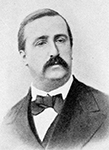SHOSTAKOVICH, BORODIN, & TCHAIKOVSKY
Notes on the composer and the pieces
Dmitri Shostakovich
Festive Overture
Alexander Borodin
Polovtsian Dances from Prince Igor
Piotr Ilyich Tchaikovsky
Symphony No. 5
Return to Home Page |

Alexander Borodin: Polovtsian Dances from Prince Igor
Russian composer Alexander Porfiryevich Borodin (1833–1887) was the illegitimate son of a nobleman and peasant mother. His origins condemned him to serfdom, but his parents saw that he was well educated, and he was released from serf status at age ten when his father died. Like many composers, Borodin showed an early affinity for music, taking piano lessons and teaching himself cello. Also like many composers, he had other gifts—in his case, chemistry—and it was that gift that he first pursued. A degree in chemistry was not available then, so in 1850, he went to medical school. After that, he worked as a surgeon in the army where he met a fellow soldier (and composer), Modeste Mussorgsky. In 1862, he completed a post doctorate in Heidelberg, where he met Dmitri Mendeleyev, the author of the periodic table. He also did research in Italy. After marrying a pianist and establishing a family, he worked diligently as a doctor and chemist. He became known for his research on aldehydes, but frustration over lack of funding turned him to teaching. An advocate of women’s rights and education, thanks to his wife, Borodin founded and, for the last twelve years of his life, ran the School of Medicine for Women in St. Petersburg.
In 1862, Borodin joined a group of Russian composers known as the “Mighty Five,” “Mighty Handful,” or “Russian Five,” who promoted music based on Russian folk sources, as opposed to the academic and Germanic model from the West. The Five was led by Mily Balakirev and included Mussorgsky, Nikolai Rimsky-Korsakov, and Cesar Cui. (Tchaikovsky, not a member of this group, would become a bridge between the German and Russian schools.)
Borodin was not a prolific composer, partly because of his professional work, but also because of his wife’s poor health; he completed no major works after age 48. He produced his first symphony in 1867 and his second (and most famous) in 1876. He died with his Third Symphony unfinished; Alexander Glazunov completed it in 1887. In the Steppes of Central Asia (1880) is one of his most popular works. He also wrote two string quartets and other chamber music, piano works, and songs. Another project was collaboration with Cui, Mussorgsky, and Rimsky-Korsakov on the ballet-opera Mlada. Borodin’s responsibility was Act 4. The work was mostly completed by 1872 but never staged. (In 1890, Rimsky-Korsakov wrote his own Mlada to the same libretto.) Rimsky-Korsakov wrote often about how he wished Borodin would spend more time composing.
Borodin’s grandest work was the opera Prince Igor. Perhaps the most nationalist of Russian operas, Igor is based on the Russian epic, The Tale of Igor’s Campaign, about Prince Igor Svyatoslavich’s 1185 campaign against the invading Cumans, a nomadic Turkic tribe that Russians called “Polovtsians.” The opera is centered on the capture of Igor and his son by the Polovtsians. Borodin began it in 1869 and worked on the piece for years. He wrote his own libretto as he composed, as Mussorgsky did with Khovanshchina. Working that way may have hindered the progress of both, and neither Khovanshchina nor Prince Igor was finished. After Borodin’s death, Rimsky-Korsakov and Glazunov completed Igor, with Glazunov essentially writing the third of its four acts.
Some of Prince Igor was included in the earlier collaborative, Mlada. Parts were adapted for the 1953 Broadway musical Kismet, most notably from the first of the Polovtsian Dances, for the song “Stranger in Paradise.” Borodin actually won the Tony award for “Best Musical” in 1954.
BPolovtsian Dances, orodin’s best known work, is taken from Act II, where dancers entertain the captured Prince and his son. Rimsky-Korsakov helped Borodin prepare the dances so they could be performed as an orchestral concert piece, with or without a chorus. The work is colorful and Eastern-exotic in tone, including a slow, romantic, and nocturnal section and a set of highly rhythmic, even savage, dances.
—Roger Hecht
Roger Hecht plays trombone in the Mercury Orchestra, Lowell House Opera, and Bay Colony Brass (where he is the Operations/Personnel Manager). He is a former member of the Syracuse Symphony, Lake George Opera, New Bedford Symphony, and Cape Ann Symphony. He is a regular reviewer for American Record Guide, contributed to Classical Music: Listener’s Companion, and has written articles on music for the Elgar Society Journal and Positive Feedback magazine. His latest fiction collection, The Audition and Other Stories, includes a novella about a trombonist preparing for and taking a major orchestra audition (English Hill Press, 2013).
Return to Home Page
|
